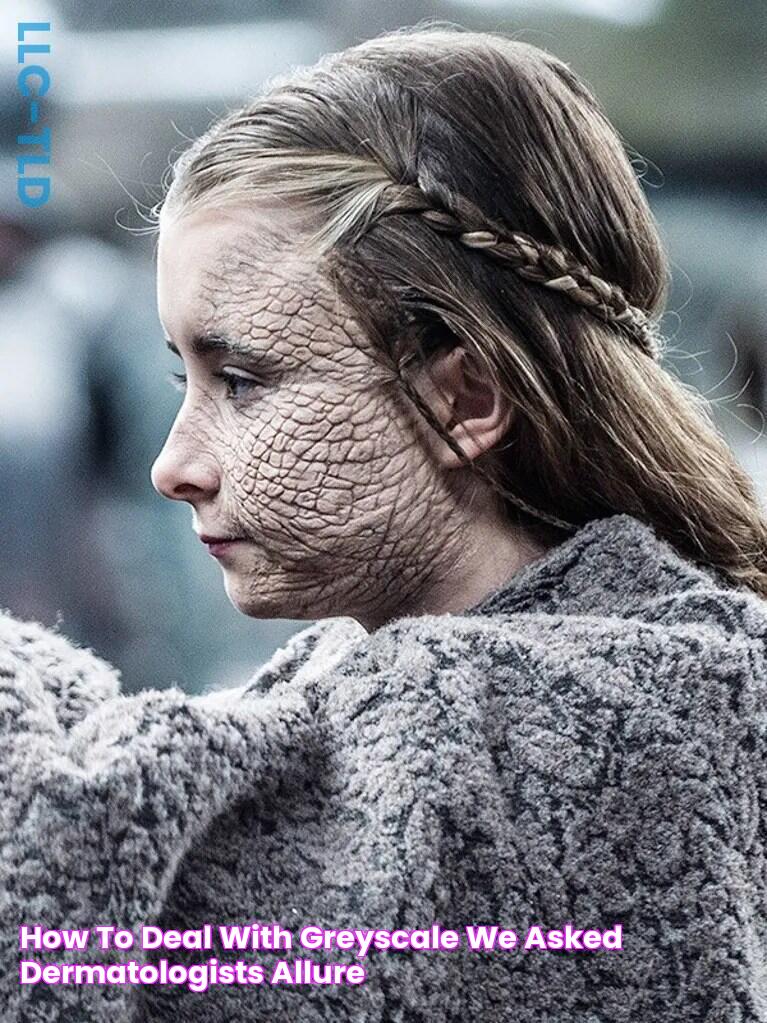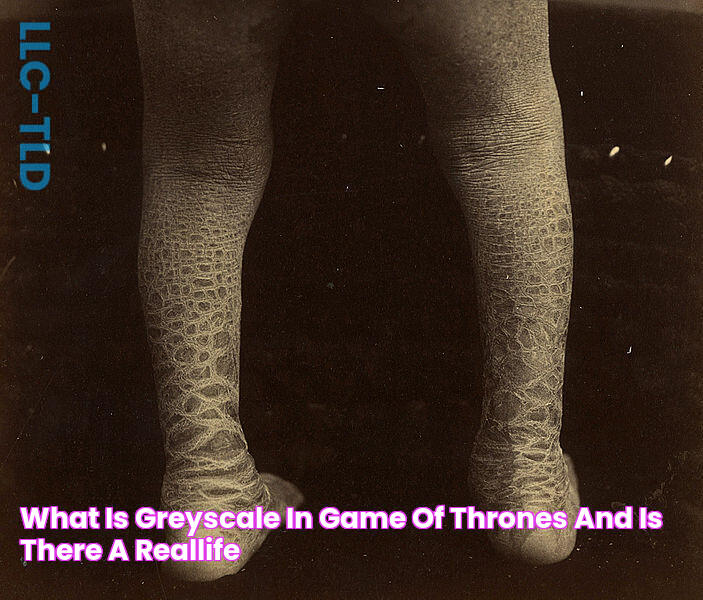Discover The Shocking Skin Disease From Game Of Thrones: Learn More Now
In the popular HBO series Game of Thrones, a fictional skin disease known as "greyscale" plays a significant role. The disease is highly contagious and causes the skin to become scaly, cracked, and discoloured, eventually leading to death if left untreated.
The disease is thought to be a metaphor for the dangers of prejudice, discrimination, and social isolation. It is also a reminder of the fragility of life and the importance of compassion and understanding.
The main article will explore the following topics:
Read also:Your Trusted Funeral Home In Gainesville Tx Compassionate Care
- The symptoms and causes of greyscale
- The social and psychological impact of the disease
- The role of greyscale in the overall narrative of Game of Thrones
Game of Thrones Skin Disease
The fictional skin disease known as "greyscale" in the HBO series Game of Thrones has captured the attention of viewers and readers alike. Its distinctive symptoms, social implications, and metaphorical significance make it a compelling topic of discussion. Here are seven key aspects of greyscale:
- Contagious: The disease spreads rapidly through touch.
- Deadly: If left untreated, greyscale eventually leads to death.
- Disfiguring: The disease causes the skin to become scaly, cracked, and discoloured.
- Isolating: Sufferers are often shunned and feared by society.
- Metaphorical: Greyscale represents prejudice, discrimination, and social isolation.
- Fragility: The disease serves as a reminder of the fragility of life.
- Hope: Despite its grim prognosis, greyscale can be cured, offering a glimmer of hope.
These aspects of greyscale highlight its importance in the narrative of Game of Thrones. The disease not only affects the physical health of its victims but also has profound social and psychological consequences. It forces characters to confront their own prejudices and fears, and it challenges the boundaries of society. Ultimately, greyscale serves as a powerful reminder of the human condition, and the importance of compassion and understanding.
1. Contagious
In the HBO series Game of Thrones, the fictional skin disease known as "greyscale" is highly contagious and spreads rapidly through touch. This aspect of the disease is significant because it highlights the dangers of prejudice and discrimination, which can spread just as quickly and easily as a physical disease. Just as greyscale can disfigure and kill its victims, prejudice and discrimination can destroy lives and communities.
In the real world, there are many examples of how prejudice and discrimination can spread rapidly through touch. For example, the rise of hate groups and white supremacist movements has been facilitated by the spread of hateful rhetoric online and in the media. This rhetoric can quickly radicalize individuals and lead to violence, just as greyscale can quickly spread and kill its victims.
The practical significance of understanding the contagious nature of prejudice and discrimination is that it allows us to take steps to prevent its spread. We must all be aware of the dangers of these attitudes and behaviours, and we must speak out against them whenever we see them. We must also work to create a more inclusive and just society, where everyone is treated with respect and dignity, regardless of their race, religion, gender, or sexual orientation.
2. Deadly
In the HBO series Game of Thrones, the fictional skin disease known as "greyscale" is a deadly disease that, if left untreated, will eventually lead to death. This aspect of the disease is significant because it highlights the dangers of prejudice and discrimination, which can also be deadly if left unchecked.
Read also:Indulge In The Distinct Flavor Discover The Unique Taste Of Target Keyword
- Facet 1: Physical Death
Just as greyscale can lead to the physical death of its victims, prejudice and discrimination can also lead to the physical death of its victims. For example, hate crimes and acts of violence motivated by prejudice and discrimination are responsible for the deaths of countless people each year.
- Facet 2: Social Death
In addition to physical death, prejudice and discrimination can also lead to "social death." This is a state of being in which an individual is excluded from society and denied access to basic rights and opportunities. Social death can be just as devastating as physical death, as it can lead to isolation, poverty, and despair.
- Facet 3: Spiritual Death
Prejudice and discrimination can also lead to spiritual death. This is a state of being in which an individual loses their sense of purpose and meaning in life. Spiritual death can be just as devastating as physical or social death, as it can lead to a loss of hope and a sense of hopelessness.
- Facet 4: The Importance of Treatment
Just as greyscale can be treated if caught early, prejudice and discrimination can also be treated if caught early. The key to treatment is education and awareness. We must all be aware of the dangers of prejudice and discrimination, and we must speak out against them whenever we see them. We must also work to create a more inclusive and just society, where everyone is treated with respect and dignity, regardless of their race, religion, gender, or sexual orientation.
The deadly nature of greyscale is a powerful reminder of the dangers of prejudice and discrimination. We must all be vigilant in fighting against these evils, and we must never give up hope that one day we will create a world where everyone is treated with respect and dignity.
3. Disfiguring
The disfiguring nature of greyscale is one of its most striking features. The disease causes the skin to become scaly, cracked, and discoloured, giving its victims a grotesque and frightening appearance. This disfigurement is not only physically painful, but it also has a profound psychological impact. Victims of greyscale are often shunned and feared by society, and they may even come to see themselves as monsters.
- Facet 1: Social Stigma
In the real world, people with disfigurements often face social stigma and discrimination. They may be excluded from social activities, denied employment opportunities, and even subjected to violence. This stigma can have a devastating impact on their mental health and well-being.
- Facet 2: Loss of Identity
The disfigurement caused by greyscale can lead to a loss of identity. Victims may no longer recognize themselves in the mirror, and they may feel like they have lost a part of themselves. This can lead to feelings of shame, depression, and anxiety.
- Facet 3: Isolation
The social stigma surrounding greyscale often leads to isolation. Victims may be shunned by their friends and family, and they may feel like they have nowhere to turn. This isolation can be extremely damaging, and it can lead to feelings of loneliness, hopelessness, and despair.
- Facet 4: Overcoming the Stigma
Despite the challenges they face, people with disfigurements can overcome the stigma and live full and happy lives. There are many support groups and organizations that can provide them with resources and assistance. Additionally, there are laws in place to protect people with disfigurements from discrimination.
The disfiguring nature of greyscale is a powerful reminder of the importance of acceptance and compassion. We must all work to create a more inclusive society, where everyone is treated with respect and dignity, regardless of their appearance.
4. Isolating
In the HBO series Game of Thrones, the fictional skin disease known as "greyscale" has severe social consequences. Sufferers are often shunned and feared by society, becoming isolated and alone.
This aspect of the disease highlights the real-life stigma and discrimination faced by people with disfigurements or chronic illnesses. In our society, individuals who are different are often marginalized and excluded. This can have a devastating impact on their mental health and well-being.
The isolation experienced by sufferers of greyscale is a powerful reminder of the importance of acceptance and compassion. We must all strive to create a more inclusive society, where everyone is treated with respect and dignity, regardless of their appearance or health status.
5. Metaphorical
In the HBO series Game of Thrones, the fictional skin disease known as "greyscale" is a powerful metaphor for prejudice, discrimination, and social isolation. This connection is evident in several key ways:
- Facet 1: Physical Manifestations
Just as greyscale visibly disfigures and isolates its victims, prejudice, discrimination, and social isolation can also have devastating physical consequences. For example, people who experience discrimination may be more likely to suffer from chronic health conditions, mental illness, and substance abuse. Additionally, social isolation can lead to loneliness, depression, and even premature death.
- Facet 2: Social Stigma
Both greyscale and prejudice are associated with social stigma. People with greyscale are often shunned and feared, just as people who experience prejudice are often marginalized and excluded. This stigma can make it difficult for victims to get the help and support they need, and it can also lead to feelings of shame and isolation.
- Facet 3: Cycle of Oppression
Greyscale is a contagious disease that can spread rapidly through touch. Similarly, prejudice and discrimination can also spread quickly and easily through social interactions. This can create a cycle of oppression, in which victims of prejudice and discrimination are further marginalized and isolated.
- Facet 4: Hope for Redemption
While greyscale is a deadly disease, it is also curable. This offers hope for redemption and recovery, both for victims of greyscale and for victims of prejudice and discrimination. In the real world, there are many organizations and individuals who are working to fight prejudice and discrimination, and to create a more just and inclusive society.
The connection between greyscale and prejudice, discrimination, and social isolation is a powerful reminder of the dangers of these social ills. It is also a reminder that we all have a responsibility to fight against prejudice and discrimination, and to create a more inclusive and just society for all.
6. Fragility
In the HBO series Game of Thrones, the fictional skin disease known as "greyscale" is a stark reminder of the fragility of life. This connection is evident in several key ways:
- Facet 1: Mortality
Greyscale is a deadly disease that, if left untreated, will eventually lead to death. This serves as a powerful reminder of the fact that life is precious and can be taken away at any moment. Just as greyscale can strike anyone, regardless of their age, health, or social status, so too can death come to us all, often unexpectedly.
- Facet 2: Impermanence
Greyscale is a progressive disease that gradually disfigures and destroys its victims. This process is a metaphor for the impermanence of all things in life. Just as greyscale slowly but surely consumes its victims, so too does time take its toll on all of us. Our bodies age, our minds deteriorate, and eventually, we all must face our own mortality.
- Facet 3: Uncertainty
The exact cause of greyscale is unknown, and there is no sure cure. This uncertainty mirrors the uncertainty of life itself. We never know what the future holds, and we cannot always control the events that befall us. Greyscale is a reminder that life is full of surprises, both good and bad.
- Facet 4: Hope
Despite its deadly nature, greyscale is not always fatal. There is a cure, and with early treatment, victims can be saved. This offers a glimmer of hope in the face of adversity. Just as greyscale can be overcome, so too can the challenges and difficulties of life. We must never give up hope, even in the darkest of times.
The connection between greyscale and the fragility of life is a powerful reminder to cherish each moment and to live life to the fullest. We never know when our time will come, so we must make the most of the time we have.
7. Hope
In the HBO series Game of Thrones, the fictional skin disease known as "greyscale" is a deadly and disfiguring disease. However, despite its grim prognosis, greyscale can be cured, offering a glimmer of hope to its victims. This aspect of the disease is significant because it highlights the importance of hope in the face of adversity.
In the real world, there are many diseases and conditions that have no cure. However, even in the face of such grim prognoses, hope is essential. Hope can give patients the strength to fight on, to endure the pain and suffering, and to never give up. Hope can also inspire others to find a cure, to develop new treatments, and to never give up on those who are suffering.
The connection between hope and "game of thrones skin disease" is a powerful reminder that even in the darkest of times, there is always hope. This hope can be a source of strength and inspiration, and it can help us to overcome even the most difficult challenges.
FAQs about "Game of Thrones Skin Disease"
This section provides answers to frequently asked questions about the fictional skin disease known as "greyscale" from the HBO series Game of Thrones.
Question 1: What is greyscale?
Greyscale is a deadly and disfiguring skin disease that is highly contagious. It is caused by a fictional microorganism and can spread through touch or contact with infected bodily fluids.
Question 2: What are the symptoms of greyscale?
The symptoms of greyscale include:
- Scaly, cracked, and discolored skin
- Loss of sensation in the affected area
- Numbness and tingling
- Pain and itching
- Fever and chills
- Nausea and vomiting
Question 3: How is greyscale treated?
There is no known cure for greyscale in the world of Game of Thrones. However, the disease can be slowed or stopped with the application of a rare and expensive ointment.
Question 4: What is the prognosis for someone with greyscale?
The prognosis for someone with greyscale is poor. If left untreated, the disease will eventually lead to death.
Question 5: What is the significance of greyscale in the story of Game of Thrones?
Greyscale is a powerful metaphor for the dangers of prejudice, discrimination, and social isolation. It is also a reminder of the fragility of life and the importance of compassion and understanding.
Question 6: How does greyscale compare to real-world skin diseases?
Greyscale is a fictional disease and does not directly correspond to any real-world skin disease. However, it shares some similarities with leprosy, a chronic infectious disease that can cause disfigurement and social stigma.
Summary: Greyscale is a deadly and disfiguring skin disease that serves as a powerful metaphor for the dangers of prejudice, discrimination, and social isolation.
Transition to the next article section: This concludes our FAQs about "game of thrones skin disease." For more information, please consult the provided references or conduct further research on reputable medical websites.
Tips on Managing and Preventing "Game of Thrones Skin Disease"
Greyscale is a fictional skin disease from the HBO series Game of Thrones, but it serves as a powerful metaphor for the dangers of prejudice, discrimination, and social isolation. Here are five tips on managing and preventing these issues in real life:
Tip 1: Educate yourself and others about prejudice and discrimination.
The first step to combating prejudice and discrimination is to understand what they are and how they manifest. Educate yourself about the different forms of prejudice and discrimination, and be aware of the subtle ways in which they can be expressed. Share your knowledge with others, and help to create a more informed and understanding society.
Tip 2: Challenge prejudiced and discriminatory behavior.
When you see or hear someone making prejudiced or discriminatory remarks, don't be afraid to speak up. Challenge their statements and point out the harm that their words are causing. Be respectful in your approach, but don't shy away from difficult conversations.
Tip 3: Be inclusive and welcoming to everyone.
Make an effort to be inclusive and welcoming to everyone, regardless of their race, religion, gender, sexual orientation, or other characteristics. Create a safe and supportive environment where everyone feels valued and respected.
Tip 4: Support organizations that fight prejudice and discrimination.
There are many organizations that are working to fight prejudice and discrimination. Support these organizations by donating your time or money, and help them to continue their important work.
Tip 5: Be a role model for others.
The best way to prevent prejudice and discrimination is to be a role model for others. Show people that it is possible to be tolerant, accepting, and inclusive. By setting a good example, you can help to create a more just and equitable society for all.
Summary: By following these tips, you can help to manage and prevent prejudice, discrimination, and social isolation. Together, we can create a more inclusive and just society for all.
Transition to the article's conclusion: This concludes our tips on managing and preventing "game of thrones skin disease." For more information, please consult the provided references or conduct further research on reputable websites.
Conclusion
As we have explored in this article, "game of thrones skin disease" is a complex and multifaceted issue with far-reaching implications. It is a metaphor for the dangers of prejudice, discrimination, and social isolation, and it serves as a reminder of the fragility of life and the importance of compassion and understanding.
While there is no easy solution to these issues, there are things that we can all do to make a difference. We can educate ourselves and others about prejudice and discrimination, challenge prejudiced and discriminatory behavior, be inclusive and welcoming to everyone, support organizations that fight prejudice and discrimination, and be role models for others. By working together, we can create a more just and equitable society for all.
The Ultimate Guide To The Best Lotions For Psoriasis Relief
Experience The Ultimate Nightlife Sensation At Sound Nightclub
The Enchanting Tale Of Lily: A Thai Actress Gracing The Silver Screen


